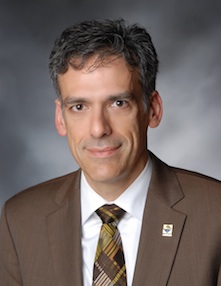By Amelia Harrington
Georgia Tech Professor Rigoberto Hernandez is a current Phi Beta Kappa Visiting Scholar. He gives lectures on his theoretical and computational chemistry and on “Advancing Science Through Diversity.” The latter is exactly what he and his team of chemists at OXIDE do. He is the head of OXIDE, the Open Chemistry Collaborative in Diversity Equity, which works with chemistry departments all over the country to promote inclusive excellence in the academic chemistry community. OXIDE is a five-year, 1.6-Million-dollar project located at Georgia Tech in collaboration with partners at M.I.T. It is funded jointly by the National Science Foundation (NSF), National Institutes of Health (NIH), and the Department of Energy (DOE). The collaborative is aimed at addressing areas of inequity on gender, ethnicity, disability, and sexual orientation spectrums.
By convening department heads, social scientists, and leaders of under-represented groups, OXIDE is able to place responsibility for change on institutions rather than on any individual change agent. It hosts biennial National Diversity Equity Workshops for department heads aimed at creating and promoting effective solutions to redressing under-representation. These workshops present a unique opportunity for interdisciplinary communication. Focus sessions detail specific barriers to equality, and how leaders in the chemistry community can overcome these barriers.
In OXIDE’s 2015 recommendations for department chairs, leaders were encouraged to create department-wide Diversity Statements and Visions, and to cultivate open discussion about equality. In his 2015 workshop presentation, University of Virginia graduate student Charles Ebersole reinforced the value of open discussion. He asserted that implicit bias, a major contributor to inequitable climates in the workplace, is most influential when people make quick decisions, or “don’t think.” By fostering a climate of awareness and questioning, the effects of implicit bias are diminished.
To this end, OXIDE facilitates open communication year-round, extending beyond the scope of biennial workshops. Hernandez described some of OXIDE’s efforts:
“We maintain dialogue in several ways utilizing both ‘old’ and ‘new’ communication mechanisms. Throughout the year, I visit several campuses, and attend conferences and workshops at which I give lectures on ‘Advancing Science through Diversity’ and I meet with faculty about instituting positive changes to level diversity inequities. The chairs of several departments routinely call or e-mail us asking for additional materials or clarifications. We provide a lot of content on our website that is constantly updated. We have published or been contributors to several articles and comments in journals and in Chemical & Engineering News. Finally, we have a large social media [following] through our twitter account, @OxideChem and our [hashtag], #DiversitySolutions.”
In 2017, OXIDE will hold the last workshop of their current five-year effort, but Hernandez and the rest of the OXIDE team don’t intend to stop after their five years are up:
“We believe that the climate in chemistry departments has improved dramatically in that time and that our efforts have played a significant role in advancing it… We are presently piloting activities to document the impacts so as to help us identify which of our activities we should prioritize. We would be pleased if the demographics had reached parity with availability and if the climate was equally equitable across underrepresented groups in research-active chemistry departments. However, the former has not yet occurred, and we don’t yet have reliable data to assess the latter. We therefore intend to pursue a renewal of our program so as to continue to address both of these fronts.”
Amelia Harrington is a junior at Randolph College majoring in English literature and dabbling in everything else. Randolph College is home to the Delta of Virginia Chapter of Phi Beta Kappa.




